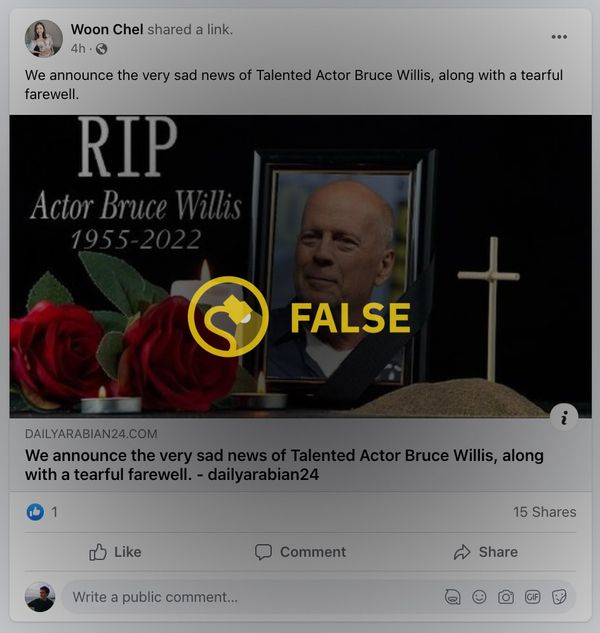

The Truth Behind Bruce Willis's Death Hoax: What You Need To Know
In an age where misinformation spreads rapidly through social media, distinguishing fact from fiction has never been more critical. Recently, a false claim circulated on various platforms, stating that renowned film actor Bruce Willis had passed away. This claim was not only misleading but also part of a dangerous trend in online misinformation. Understanding how such hoaxes emerge can help us protect ourselves and others from falling victim to them.
On November 17, 2022, Snopes received an email alerting them of a Facebook post declaring the sad news of Bruce Willis's death. This post was part of a larger narrative that has unfortunately targeted many celebrities over the years. Despite the heart-wrenching tone, credible sources confirmed that Bruce Willis was alive and well, making this claim a classic example of a death hoax.
Death hoaxes can have serious implications, not only for the individuals involved but also for their fans and loved ones. Often, these false claims are crafted to incite emotional reactions, potentially leading to harmful consequences. This article delves into the details surrounding the Bruce Willis death hoax, the motives behind such misinformation, and how to identify and combat these false narratives in our digital age.
Understanding the Hoax: The Claim and Its Origins
The false claim about Bruce Willis's death originated from a misleading Facebook post that went viral on social media. The post claimed, "We announce the very sad news of talented actor Bruce Willis, along with a tearful farewell." This type of sensational language is often used to capture attention and encourage shares, making it easier for the misinformation to spread.
Investigations revealed that the post was linked to a network of dubious websites promoting similar false stories. These sites often aim to generate traffic and ad revenue by leveraging the panic and anxiety surrounding celebrity deaths. In the case of Bruce Willis, the claim emerged on November 13, a few days before it began circulating widely.
The Dangers of Misinformation
Such hoaxes can lead to various negative consequences, including emotional distress for fans and the potential for malware distribution. Some of the sites that shared the false news attempted to install malicious software on users' devices, posing as legitimate sources. For instance, one site prompted users to download "Adobe Flash Player 7," despite the fact that Flash has been discontinued since 2020.
This situation highlights the importance of verifying information before sharing it online. Engaging in responsible social media practices not only protects you but also helps to create a more informed community. If you encounter a sensational claim, it is essential to research it through reputable news sources before spreading it further.
Identifying and Combatting Death Hoaxes
To recognize and fight back against death hoaxes, there are several key strategies you can employ. Always check the credibility of the source, look for confirmation from multiple reliable news outlets, and be wary of overly emotional language. These tactics can significantly reduce the likelihood of falling for misinformation.
When shared, these hoaxes can lead to widespread panic and confusion. For instance, in addition to Bruce Willis, other celebrities like Dwayne "The Rock" Johnson and Liam Neeson have also been victims of similar death hoaxes, with posts employing the same "very sad news" and "tearful farewell" phrases. Recognizing the patterns in these claims can empower individuals to discern fact from fiction.
What You Can Do
It is crucial to take proactive steps in combating the spread of misinformation. Here are a few tips to keep in mind:
- Always verify information through credible sources before sharing.
- Educate others about the dangers of misinformation and how to spot it.
- Report suspicious posts or websites that promote false claims.
- Stay informed about trends in misinformation to better understand how to address them.
By being vigilant and informed, we can collectively work towards reducing the impact of misinformation in our society.
Conclusion: The Importance of Awareness
As we navigate the complexities of the digital world, it is essential to remain aware of the information we consume and share. The Bruce Willis death hoax serves as a reminder of how quickly misinformation can spread and the potential harm it can cause.
To protect yourself and others, prioritize verification of information and engage in responsible online behavior. Together, we can foster a more informed community, reducing the impact of sensationalized and false claims.
Stay vigilant, stay informed!

Sources
Liles, Jordan. "Is Adobe Flash Player No Longer Supported?" Snopes, 3 Dec. 2020, https://www.snopes.com/fact-check/flash-player-no-longer-supported/.
"Malicious URL Scanner." IP Quality Score, https://www.ipqualityscore.com/threat-feeds/malicious-url-scanner.
The Controversial Allegations Against Donald Trump And Jeffrey Epstein: A Deep Dive
U.S. Bank Stadium's Shift To Vegan: What You Need To Know
The Controversy Surrounding The Hawk Tuah Girl: From Viral Fame To Job Loss
